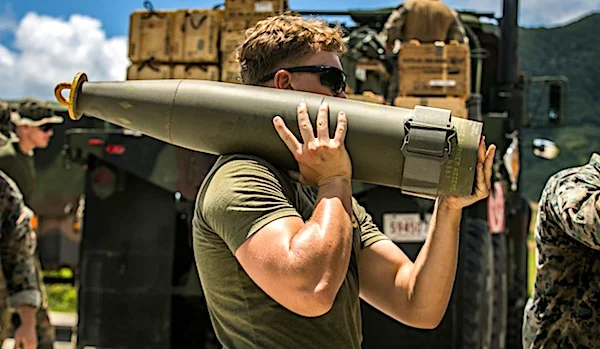- The U.S. is ramping up production of 155mm artillery ammunition faster than expected after depleting stocks for Ukraine, but it still might be barely enough to sustain Kyiv’s needs, experts told the Daily Caller News Foundation.
- The Pentagon’s weapons chief bumped up the service’s goal to produce 100,000 rounds monthly by 2025.
- “If the war continued, even if we got up to that level, we still wouldn’t have enough,” said retired Col. Mark Cancian, a senior adviser at the Center for Strategic and International Studies.
The U.S. Army has ramped up production of a critical munition after nearly depleting stocks to support Ukraine’s defensive war against Russia, but even that surge rate isn’t enough to replenish U.S. stockpiles.
In September, the Pentagon’s weapons chief bumped up the goal for 2025 to 100,000 155mm artillery rounds manufactured per month, up from the 80,000 per month forecasted in August and 36,000 estimated in 2022, according to Defense News. A flurry of production contract announcements since then shows that the Pentagon is making a strong effort to feed Ukraine’s ever-hungry artillery units until the war ends, though maintaining that production capacity in peacetime presents yet another politically testy problem, retired Col. Mark Cancian, a senior adviser at the Center for Strategic and International Studies, told the Daily Caller News Foundation.
“The U.S. is surging more than the U.S. had planned back in January,” Cancian told the DCNF.
“The fundamental problem is Ukraine is firing 150,000 to 300,000 rounds per month and the United States is talking about getting up to 100,000 per month in two years. If the war continued, even if we got up to that level, we still wouldn’t have enough,” he said.
Even with help from European countries, which have also ramped up production, those numbers would still be cutting it close relative to Ukraine’s massive needs, much less America’s own.
Ukraine burns through as many as 6,000 to 7,000 155mm rounds daily during the most intense artillery battles, officials have said.
The U.S. supplies the bulk of those rounds, and has donated more than two million 155mm rounds for the Howitzer system as well as more than 7,000 precision-guided 155mm rounds as of Sept. 21, Pentagon documents show.
Pentagon production was at 14,000 rounds monthly in early 2023, Department of Defense (DOD) Undersecretary for Acquisition and Sustainment Bill LaPlante said on Sept. 15, Reuters reported. In addition, U.S. troops consume about 100,000 rounds each year in training alone, and the military likes to keep a total inventory of about 2 million, Cancian explained to the DNCF.
Rapid depletion of ammo stocks created fears among defense officials and analysts the U.S. would run out of the widely-used round completely. Lack of inventory could cripple Ukraine’s short-range fires capability in a war that depends heavily on attrition-based artillery tactics, while eroding U.S. readiness on top of that.
“The bottom of the barrel is now visible,” Adm. Bob Bauer, NATO’s top military official, warned on Tuesday. “We give away weapons systems to Ukraine, which is great, and ammunition, but not from full warehouses.”
LaPlante said the U.S. was on track to increase production to 100,000 rounds per month by 2025, according to Reuters.
“That’s not enough to replenish U.S. stocks as long as the war is going on,” Cancian said.
The Army announced Thursday a total of $1.5 billion awarded in just the last two weeks of September to procure “each major component, material or required production process to maintain momentum” for the 80,000-by-2025 production goal. Awards made under what’s called “multi-year procurement,” where Congress allows DOD to temporarily bypass yearly budget cycles and enter into long-term contracts, will go to several contracting centers in the U.S. as well as abroad in partner nations including Poland, India and Canada.
In August, the Army awarded the first of four multi-year contracts through the end of 2023 meant to boost 155mm artillery production, Inside Defense reported. Work will continue spanning through 2027, Army acquisition chief Doug Bush said, according to Inside Defense.
At the time, the Army’s rate of production was at 24,000 rounds per month, Bush said.
“If you do the math on the 80,000 to 85,000 a month, I mean that’s a million a year. So, between supporting Ukraine, replenishing ourselves and supporting other allies, we expect to use that capacity. That’s the overall reason we’re doing it,” Bush said, according to Inside Defense.
And on Sept. 27, DOD announced $974 million for two U.S. companies, American Ordnance and General Dynamics Ordnance & Tactical Systems, to manufacture 155 mm M1128 high-explosive projectiles.
The Army wants $150.8 million in 2024 for 55,832 rounds, budget documents show. Under multi-year procurement, the service will scale up investment each year to reach $269.9 million by 2028. That amounts to roughly $2,687 per round.
Once the war ends, Cancian estimated a relatively short timeframe to rebuild U.S. stocks at the projected surge production rates.
But, increasing production means bringing new facilities online — potentially building more — and keeping equipment serviceable even when not in use, Cancian explained. That costs money, and many consider it wasteful, including some appropriators in Congress.
“The question is, how do you maintain that surge capability once peacetime returns? DOD is wrestling with that,” Cancian said.
The Army did not immediately respond to the DCNF’s request for comment.
via wnd

